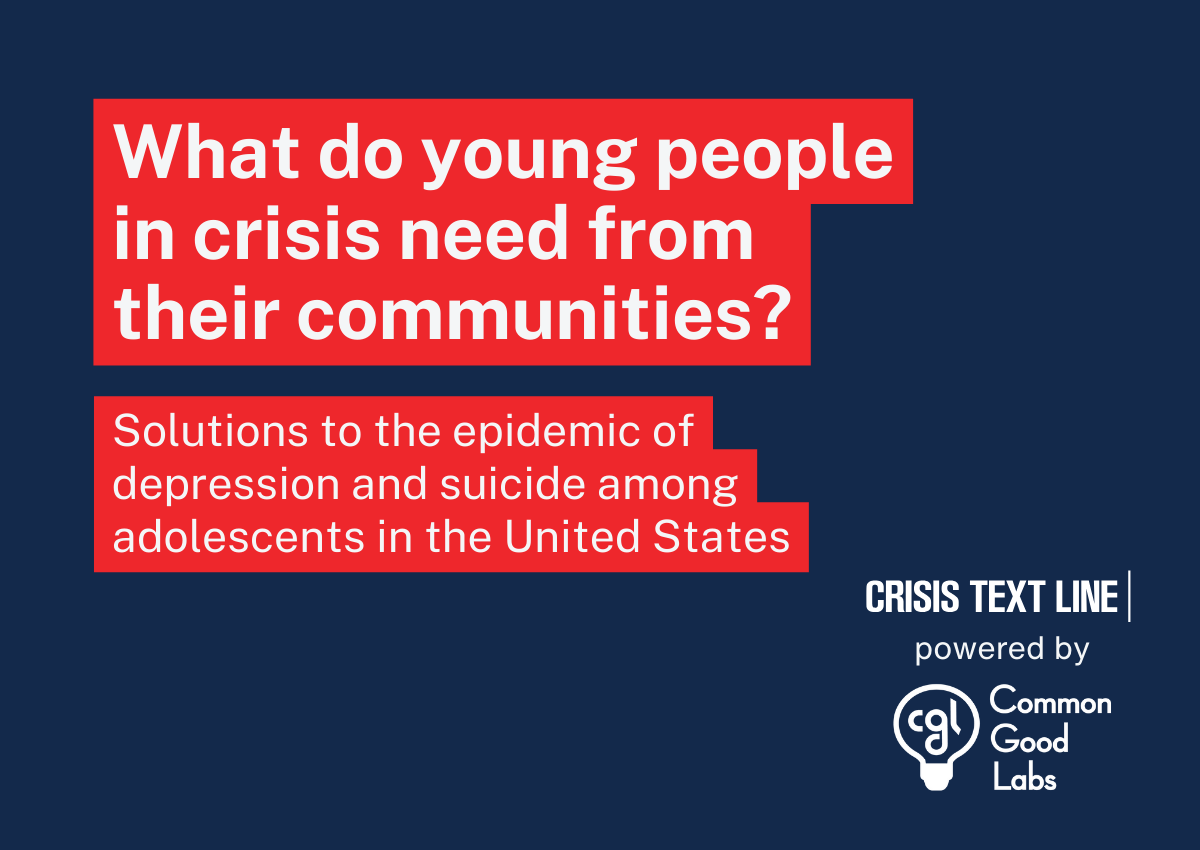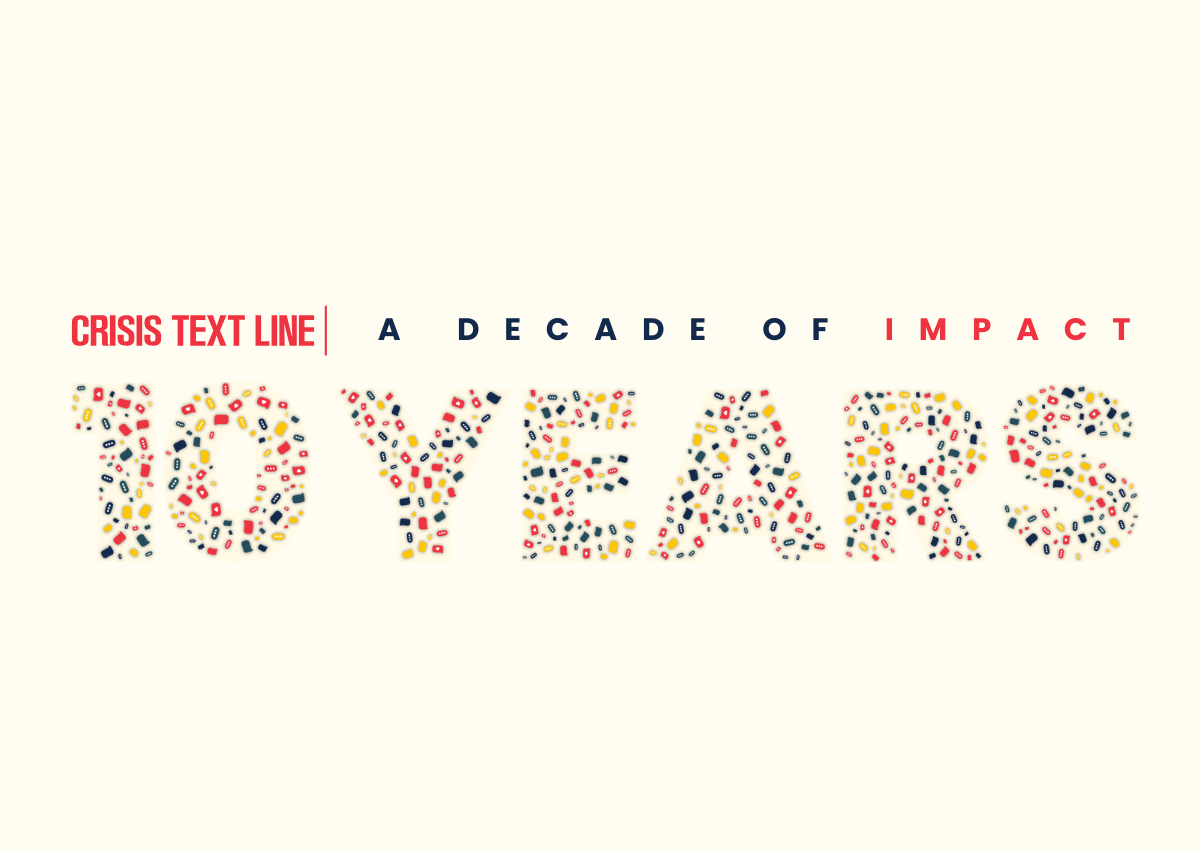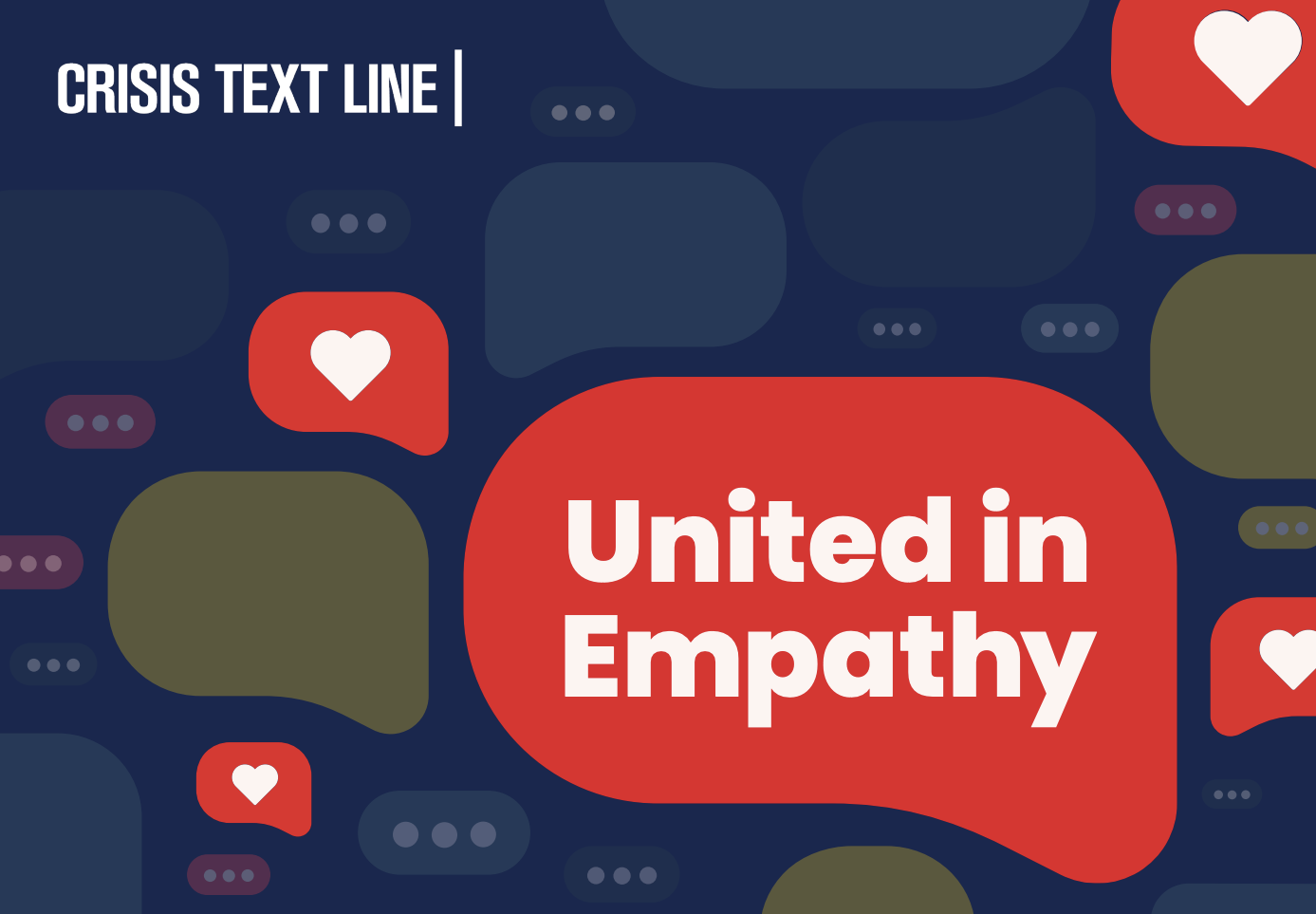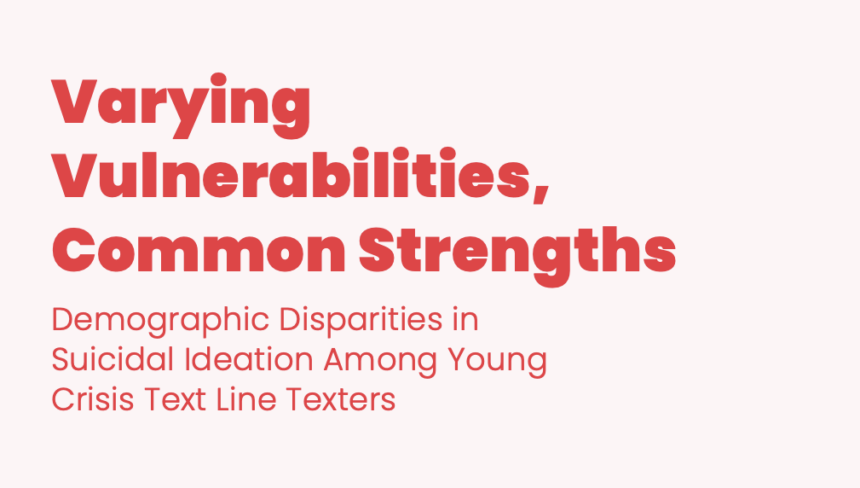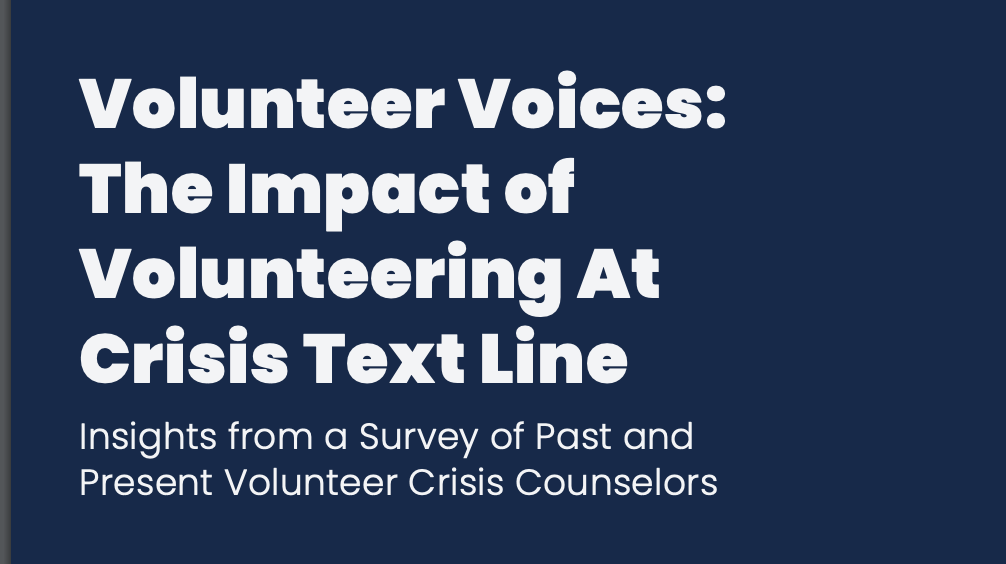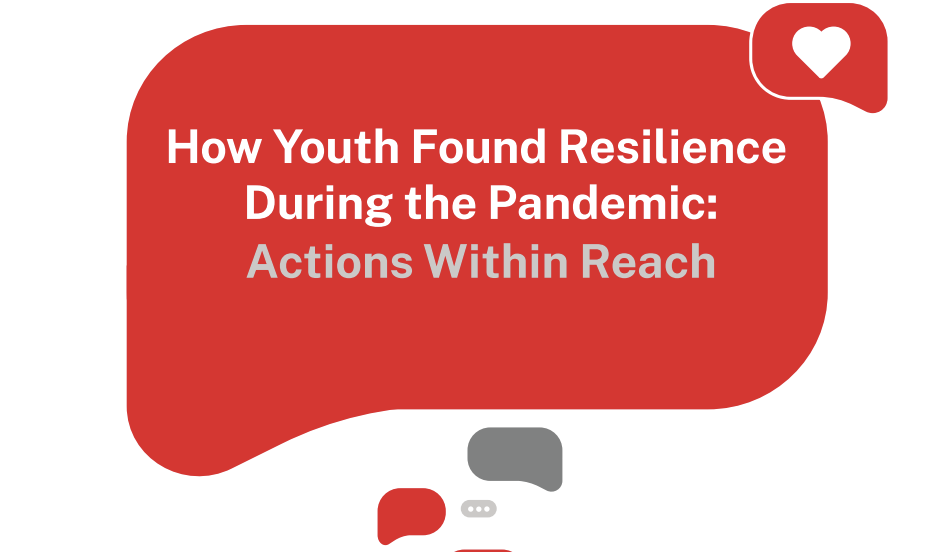Research & Impact
In-House Research
We consider it our duty to contribute insights to the field of mental health. There is a mental health emergency in the United States, and Crisis Text Line is in a unique position to contribute insights to the work of those who are hoping to address this crisis. We have had over 10 million conversations with texters in the United States. We analyze this de-identified dataset and combine it with publicly available data sources to inform the work of policymakers, journalists, and researchers. In addition to our in-house research efforts, we also support the work of research collaborators at academic institutions.
Below, you can find information on:
- Featured publications
Research briefs produced by the Research and Impact team at Crisis Text Line on what young people need to cope with crises; our 10-year impact; our annual trend report; the impact of volunteering as a crisis volunteer; and the resilience of young texters during the pandemic. - Research collaborations
A list of peer-reviewed publications produced by our research collaborators; as well as instructions on how to apply.
Research Blog
Brief insights based on 10 million+ conversations about mental health crises from the Research & Impact team.
The Impact of Online Crisis Volunteers
Crisis Text Line and its partners around the world have trained over 100,000 volunteers to date. In a recent large-scale, international study, we found that the benefits of volunteering as a crisis counselor go far beyond the positive effect on the lives of our texters.
Key insights:
- Our volunteers prevent crises in their own communities after their shift is over. For every crisis our volunteers support on the platform, they prevent at least one in their own communities. Volunteering with us equips them with skills to recognize and de-escalate crises among their friends, families, and coworkers; even strangers.
- Our volunteers are shaping the future of the mental health workforce. Half of our volunteers say that volunteering has inspired them to change careers. And, half of our volunteers say that volunteering helped them secure employment or gain admission to educational programs.
- Our volunteers believe that their training and the experience of helping people in crisis improves their own well-being. They feel better equipped to take care of their own mental health. They find it easier to form new connections and deepen existing relationships with friends, families, and coworkers.
United in Empathy: Crisis Text Line’s 5th Annual Trend Report
As a 24/7 crisis support provider, Crisis Text Line has unique insight into emerging mental health trends in the U.S. Every year, we release a summary of the most important trends observed in the previous year.
In 2023…
- Anxiety and stress were the top issues in our conversations, closely followed by relationships, depression and sadness, suicide, and isolation and loneliness.
- Self-harm and bullying surged for a third consecutive year.
- When texters discussed anxiety, they mostly discussed issues close to home: concerns over personal relationships, finances, and school.
- Texters found many creative ways to cope with anxiety and stress, primarily by talking to loved ones, family, friends, and therapists but also by listening to music and playing video games.
What Do Young People in Crisis Need from Their Communities?
Young people in the United States are facing a mental health epidemic. Over five million adolescents experienced depression in 2022, up from two million in 2010. More than 1,500 died by suicide in the same year, compared to less than 1,000 in 2010. Though depression and suicides fell in 2022, both are still far above the levels seen twelve years earlier. Suicides have grown in communities across every geographic region in the United States.
To identify solutions to this crisis, we partnered with Common Good Labs to analyze over 87,000 anonymized conversations where young texters discussed what resources help them cope. We found that adolescents need 6 resources from their communities to find relief and support in moments of mental health distress:
- Opportunities for social connection;
- Engagement in music, writing, visual, and performing arts;
- Mental health services;
- Exercise and sports programming;
- Books and audiobooks; and
- Outdoor spaces and nature, including walkable neighborhoods.
Unfortunately, many communities have been cutting funding for these resources exactly when adolescents needed them the most in order to face the challenges of the past decade. As a result, many young people are not accessing the resources that can help them cope with crises. Communities need to reframe their approach to mental health support and reinvest in community resources that young people need.
A Decade of Impact: Crisis Text Line’s 10-Year Impact Report
Every hour, there are thousands of people experiencing a crisis in the United States. Countless individuals and families, especially young people, grapple with a myriad of crises such as anxiety and depression to self-harm and suicidal ideation, which often remain hidden from the public eye.
Inspired by the power of text messaging in these moments, we founded Crisis Text Line 10 years ago. We knew young people felt at home texting on their phones. Whether someone is in a crowded classroom or lying awake in bed, texting makes it possible to reach out for support anonymously. When we launched, few believed our text-only model would work. Now, we have evidence that it is highly effective.
In this report, we tell the story of our first decade, and share insights on our impact on texters, volunteers, and society.
United in Empathy: Crisis Text Line’s 4th Annual Trend Report
For our 4th annual United in Empathy Report, the Crisis Text Line Research and Impact team analyzed 1.3 million anonymized conversations in 2022 to learn about the issues that texters discussed with us, and the coping strategies that helped them feel better.
For the first time at in 2022, ‘relationships’ became the top stressor in our conversations as 1 in 3 texters discussed relationship stress or dysfunction and 1 in 5 conversations talked about suffering from the absence of human connection – feeling isolated or lonely. With most students back at school, our texters talked 27% more about bullying than in 2021. Substance use as an issue increased in our conversations, and texters also used more words related to opioids and painkillers than last year. Listening to music was the most common technique for our texters; 1 in 4 mentioned that it helped.
Suicide is the second leading cause of death for young people (ages 10-24), and some groups of young people are especially at risk. In early 2023, Crisis Text Line Research & Impact conducted a study to examine which young people may be at risk of suicidal ideation within our texters, and consider how race and ethnicity, sexual identity, gender identity, and age may be associated with higher levels of suicidal ideation for some groups.
Among other things, we learned that the youngest texters (13 years or younger) were most likely to mention suicide, and that music was the most coping mechanism for young people with suicidal ideation; followed by rest, community, and making visual art.
Volunteer Voices:
The Impact of Volunteering at Crisis Text Line
Crisis Text Line has trained over 65,000 volunteer Crisis Counselors since launching its text-based mental health and crisis intervention service almost a decade ago. We surveyed 3,438 past and present volunteers to explore how the experience of volunteering at Crisis Text Line has impacted them, their relationships, careers, and communities.
The results emerging from this study paint a picture of how volunteering at Crisis Text Line shapes the lives of Crisis Counselors, their relationships, and communities. Donating time to help people in the worst moments of their lives has equipped our volunteers with skills, practice, and a platform to improve the mental health of others. It also taught them to take better care of their own mental health and improved their relationships to others.
How Youth Found Resilience During the Pandemic:
Actions Within Reach
The COVID-19 pandemic tested the resilience of many, but young people were in an especially difficult position as their routines, social structures, and rites of passage were disrupted; many also lost caregivers. In 2022, we published a report with insights from Crisis Text Line conversations with young people under 18 who reached out to us between 2019 and 2021. The findings include the most pressing crises on the minds of young texters and the resources that helped them cope.
We found that young texters talked significantly more about stress and anxiety, isolation and loneliness, grief and bereavement, and eating disorders and body issues during 2019-2021. Listening to music and making music remained the most common coping strategy, along with reading and writing, sleeping and bathing, making art, and talking to friends.
Research Collaborations
We support research efforts that might contribute solutions to the field of mental health. Over the past decade, researchers at our in-house Research & Impact team and our academic research collaborators have published over 26 peer-reviewed articles based on these anonymized and de-identified exchanges. These papers have been cited over 600 times.
We hold our research partners to rigorous vetting standards because we care deeply about texters’ privacy, and take the privilege of analyzing anonymized conversations seriously.
To be a Research Collaborator, you must meet the following key requirements:
- Be affiliated with an academic or research institution. This includes obtaining the approval of an Institutional Review Board (IRB), having a Principal Investigator that’s a full-time employee of the institution, and the written approval of your institution’s Office of Research or equivalent office.
- Expect to spend 3+ months working with our de-identified, anonymized data.
- Have the technical expertise to work with massive data sets.
- Complete our volunteer Crisis Counselor training to better understand our data.
- Be a U.S. or Canadian citizen. We need this for background checks.
Please note that we are currently not accepting new applications. We are excited to hear from you in winter 2023-2024 when our applications reopen.
Published Research
See the list of published papers from research collaborators below.
-
Cascading disasters and mental health: the February 2021 winter storm and power crisis in Texas, USAResearchers evaluated mental health consequences of the 2021 winter weather event. They found that these events negatively impact mental health in high-impact regions for up to 11 months post-event. Margaret M. Sugg, Luke Wertis, Sophia C. Ryan, Shannon Green, Devyani Singh, Jennifer D. Runkle (2023), Science of the total environment, 880, 163231.
-
Researchers evaluated different strategies to help volunteers achieve goals. They found that both breaking goals into subgoals and increasing flexibility helped boost goal achievement. Aneesh Rai, Marissa A. Sharif, Edward H. Chang, Katherine L. Milkman, Angela L. Duckworth (2023), Journal of Applied Psychology, 108, 621.
-
Researchers examined the mental health impacts of the COVID-19 pandemic, finding that both essential workers and their children had elevated crisis outcomes. Margaret M. Sugg, Jennifer D. Runkle, Sophia C. Ryan, Devyani Singh, Shannon Green, Martie Thompson (2023), Public Health Reports, 138, 369-377.
-
Researchers found higher firearm-related crisis conversations for several days after the Uvalde mass shooting, suggesting that these events have broad mental health implications. Kirsty J. Weitzel, Robert F. Chew, Adam Bryant Miller, Caroline W. Oppenheimer, Ashley Lowe, Anna Yaros (2023), JMIR public health and surveillance, 9, e42811.
-
Researchers evaluated the mental health impacts of Hurricane Ida, finding broad increases in crisis-related texts in affected areas up to four months post-impact. Luke Wertis, Jennifer D. Runkle, Margaret M. Sugg, Devyani Singh (2023), GeoHealth, 7, e2022GH000707
-
Researchers examined bereavement-related conversations during the COVID-19 pandemic, finding higher risk in the Southeastern US during fall 2020. Sophia C. Ryan, Jennifer D. Runkle, Margaret M. Sugg, Devyani Singh, Shannon Green, Luke Wertis (2023), Journal of Adolescent Health, 72, 156-159.
-
Researchers examined the texter population served by Crisis Text Line. Findings support the decision to include texting in the national 988 rollout. Anthony R. Pisani, Madelyn S. Gould, Carlos Gallo, Ashkan Ertefaie, Caroline Kelberman, Donald Harrington, Daniel Weller, Shannon Green (2022), Suicide and Life-Threatening Behavior, 52, 567-582.
-
Researchers assessed Crisis Text Line's effectiveness. Nearly 90% of suicidal texters said that the conversation was helpful, and nearly half reported being less suicidal. Madelyn S. Gould, Anthony Pisani, Carlos Gallo, Ashkan Ertefaie, Donald Harrington, Caroline Kelberman, Shannon Green (2022), Suicide and Life-Threatening Behavior, 52, 583-595.
-
Researchers found patterns of crisis profiles during the COVID-19 pandemic. More severe suicidality was seen in higher-risk groups. Jennifer D. Runkle, Shrikanth Yadav, Kurt Michael, Shannon Green, Jaclyn Weiser, Margaret M. Sugg (2022), Journal of Adolescent Health, 70, 48-56.
-
Researchers investigated the impacts of wildfires and COVID-19 on mental health crisis help-seeking patterns after the worst wildfire season on record. Margaret M. Sugg, Jennifer D. Runkle, Sarah N. Hajnos, Shannon Green, Kurt D. Michael (2022), Science of the total environment, 806, 150391.
-
Researchers examined crisis concerns in essential workers and children of essential workers, finding that both groups were at higher risk than non-essential-workers during the pandemic. Margaret M. Sugg, Jennifer D. Runkle, Lauren Andersen, Jaclyn Weiser, Kurt D. Michael (2021), Preventive medicine, 153, 106852.
-
Researchers examined grief and bereavement in the context of a pandemic, particularly among young people during the ongoing COVID-19 pandemic. Stella R. Harden, Jennifer D. Runkle, Jaclyn Weiser, Shannon Green, Margaret M. Sugg (2021), Journal of Adolescent Health, 69, 140-143.
-
Researchers studied help-seeking behavior before and after Hurricane Florence. They found an immediate increase in crisis texts for stress/anxiety and suicide. Findings show a need for support following a weather disaster. Jennifer D. Runkle, Kurt D. Michael, Scott E. Stevens, Margaret M. Sugg (2021), Science of the total environment, 750, 141702.
-
Researchers studied phrasing in crisis counseling, finding that focusing on next steps happens at the expense of building rapport, while focusing on exploring can stall progress towards a goal. Justine Zhang, Cristian Danescu-Niculescu-Mizil (2020), Proceedings of the 58th Annual Meeting of the Association for Computational Linguistics, 5276-5289.
-
Researchers analyzed the engagement of subgroups of texters who reported suicidality. They found that most texters who reported suicidal ideation had similar issues; the difference in issues may inform how Crisis Counselors tailor strategies. Hannah Selene Szlyk, Kimberly Beth Roth, Víctor García-Perdomo (2020), Psychiatric services, 71, 319-327.
-
Researchers described strategies for evaluating the relationship between crisis counselors' conversational behavior and outcomes. Justine Zhang, Sendhil Mullainathan, Cristian Danescu-Niculescu-Mizil (2020), Proceedings of the ACM on Human-Computer Interaction, 4, 1-24.
-
Researchers sought to understand how text message-based crisis counseling facilitates child maltreatment disclosures. The findings of this study have important implications for the use of technology to support disclosure of child maltreatment. Laura Schwab-Reese, Nitya Kanuri, Scottye Cash (2019), JMIR mHealth and UHealth, 7, 3.
-
Researchers studied crisis patterns in youth following 13 Reasons Why (Season 2) and celebrity suicides. They found that both were followed by an abrupt rise in crisis help-seeking among adolescents. Margaret M. Sugg, Kurt D. Michael, Scott E. Stevens, Robert Filbin, Jaclyn Weiser, Jennifer D. Runkle (2019), Preventive medicine reports, 16, 100999.
-
Researchers found that, with experience, crisis counselors evolve in their choice words, get faster, and write more diverse messages. Justine Zhang, Robert Filbin, Christine Morrison, Jaclyn Weiser, Cristian Danescu-Niculescu-Mizil (2019), Proceedings of the 57th Annual Meeting of the Association for Computational Linguistics, 936–947.
-
Researchers studied the relationship between crisis support-seeking behavior in young adults/adolescents and temperature. Results suggest a significant association between temperatures and crisis help-seeking behaviors in urban areas. Margaret M. Sugg, P. Grady Dixon, Jennifer D. Runkle (2019), Science of the Total Environment, 699, 400-411.
-
Researchers wrote guidelines for organizations aiming to develop data-sharing partnerships. Anthony R Pisani, Nitya Kanuri, Bob Filbin, Carlos Gallo, Madelyn Gould, Lisa Soleymani Lehmann, Robert Levine, John E Marcotte, Brian Pascal, David Rousseau, Shairi Turner, Shirley Yen, Megan L Ranney (2019), Journal of Medical Internet Research, 21, e11507
-
Researchers explored help seeking behavior after the release of Netflix series 13 Reasons Why (Season 1). They found elevated volume for suicidal thoughts as well as a significant, but momentary, rise in Crisis Text Line volume. Laura K. Thompson, Kurt D Michael, Jennifer Runkle, Margaret M. Sugg (2019), Preventive medicine reports, 14, 100825.
-
Researchers investigated the relationship between geospatial suicide clusters and emergency responses initiated by Crisis Text Line. Mark E. Larsen, Michelle Torok, Kit Huckvale, Bilal Reda, Sofian Berrouiguet, Helen Christensen (2019), 41st Annual International Conference of the IEEE Engineering in Medicine and Biology Society (EMBC), 6109-6112.
-
Researchers examined help seeking behavior in adolescents. Rurality was the strongest predictor for low rates of help-seeking and high rates of suicides; rural areas should be the target of future research, intervention, and outreach. Laura K. Thompson, Margaret M. Sugg, Jennifer R. Runkle (2018), Social science & medicine, 215, 69-79.
-
Researchers developed a set of computational discourse analysis methods to measure how linguistic aspects of conversations are correlated with crisis conversation outcomes. Tim Althoff, Kevin Clark, Jure Leskovec (2016), Transactions of the Association for Computational Linguistics, 4, 463-476.
-
Researchers developed a system that provides topic modeling of conversations and graphical visualization of topic distributions. Karthik Dinakar, Jackie Chen, Henry Lieberman, Rosalind Picard, Robert Filbin (2015), Proceedings of the 20th international conference on intelligent user interfaces, 417-426.


